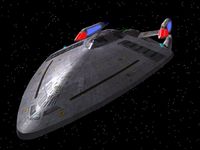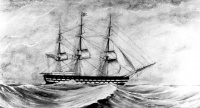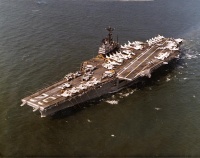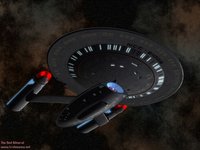Previous ships called Independence
| USS Independence-A | ||
|---|---|---|
 LOST | ||
| ||
Independence is a name which has been bestowed upon a number of ships, ranging from a cruise liner and a frieghter to two aircraft carriers. It has twice been the name given to the lead ship of its class and is a name which recurs through-out the history of Earths US Navy. The name's meaning of freedom and liberty has ensured that the name has passed to Starfleet vessels that have followed over half a millenium after the first naval vessel.
Independence
USS Independence
USS Independence
The third ship to bear the name, this Independence was the first ship of the line commissioned by the US Navy. Launched on 22nd June 1814, during the War of 1812, she immediately saw action alongside the frigate USS Constitution defending the approaches to Boston Harbor. Upon the conclusion of the conflict, Independence sailed to the Mediterranean as part of a task force of 10 ships in the Second Barbary War. The flagship of Commodore Bainbridge, conflict had ceased before Independence reached the region. Modifications in 1836 reduced the ship size as Independence became a Frigate. She was one of the largest and fastest frigates in the US Navy, setting a record for fastest trans-Atlantic crossing in May/June 1837. In following decades, she twice served as flagship of the Pacific Squadron, including during the Mexican-American War. Indy was present for both the capture of Guaymas in October 1947 and the occupation of Mazatlán a month later. By the end of the 1850's, she was serving as a receiving ship at Mare Island Navy Yard; a role she continued in until she was finally decommissioned in 1912. Independence was sold in 1914 and scrapped the following year. Over the course of the 98 years that she was in commission, she served as flagship for no fewer than 7 Commodores.
USS Independence - SP-3676
USS Independence - CVL-22
- "The difficult we do immediately; ....the impossible takes a little longer"
The lead ship of the US Navys' Independence Class Aircraft Carrier, the fifth Independence was launched on 22nd August 1942 and commissioned on 14th January the following year, in the midst of World War II. Laid down as the light cruiser USS Amsterdam, it was converted to a light aircraft carrier in mid-construction. After shakedown in the Caribbean Sea, the carrier crossed into the Pacific Ocean to join the Pacific Fleet of the US Navy. It was involved in attacks on Marcus I., Wake I. and the Gilbert Is. before repairs in 1944 required due to a torpedo attack from Japanese aircraft. Upon return to action, the Independence was involved in attacks on the Philippines, including involvement in the key Battle of Leyte Gulf. Independence provided air support for the Battle of Okinawa as the war in the Pacific came to a conclusion. The carrier then transported troops back to the USA before being used as a target for Atomic bomb tests at Bikini Atoll. Indy survived two atomic blasts before decommissioning in August 1946; she was scuttled off the coast of California five years later.
SS Independence
USS Independence - CV-62
- "Freedom's Flagship"
The second aircraft carrier of Earth's US Navy to bear the name. A Forrestal Class ship, she was launched at the New York Navy Yard on 6th June 1958 and commissioned on the 10th January the following year. Independence played a highly visible part of the blockade of Cuba during the Cuban missile crisis of 1962 before being decorated for service in the Vietnam War in 1965. The carrier spent the majority of its service in the Mediterranean Sea before a major refit in the mid 1980's and then served most of the early 90's in the Persian Gulf during the Gulf War and its aftermath. After over 39 years of service, this Independence was decommissioned on 30th September 1998, having been the oldest ship in the active fleets of the US Navy for its final three years of service.
USS Independence - LCS-2
USS Independence - NCC-01776
- "A little revolution is good every now and then."
A New Orleans class Starfleet vessel, this Independence was commissioned in 2366 and saw service in the Dominion War. Having survived the war, it underwent a scheduled refit in 2379. The vessel then saw action in the Ithassa Region under the command of Captain Jessa Anassasi. The ship served with distinction in the region, recognised in part by Starfleet by the fact that Captain Anassasi was a Rear Admiral within 4 years of taking command. The vessel was destroyed in an attempted Gorn invasion of the region, being rammed into the Gorn vessel Emperor's Fang by Commander Mar in the climactic Battle of Deep Space 17 on 26th September 2383.




